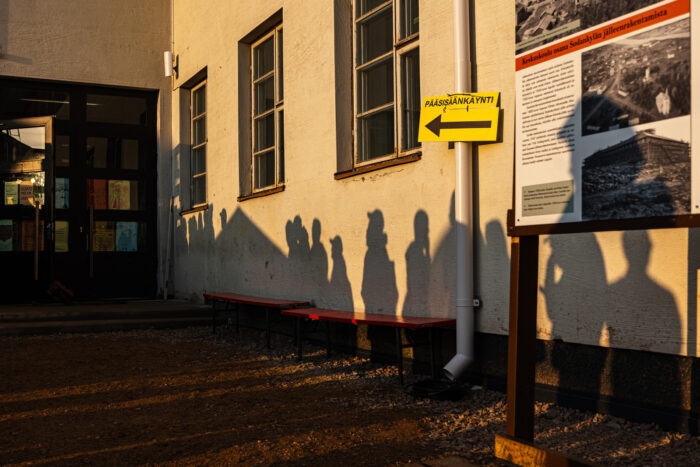The Festival’s 40th anniversary took off with serpentine lines in wait for ticket sales. The morning proceeded with discussions regarding the meaningfulness and possibilities of film education in the Film Education Matinee. Ari Lehtola opened the matinee, acknowledging the long history the festival has in relation to film education: “The Midnight Sun Film Festival has been an active educator of film and cinema from the mid 1990’s”.
The matinee was led with the expertise of the film education specialist Kaisa Kukkola, who grounded the need for films in schools and other areas of education: “Each thing we give time and space to, begins to create meanings within us”.
During the noon, Pirjo Honkasalo’s latest drama Orenda kicked off the long awaited series of festival screenings. The film, also starring the screenwriter, Pirkko Saisio, seizes the audience to think of questions of guilt and belief in the breathtaking scenery of the Finnish archipelago.
The Big Tent’s first film was the free screening of Kekkonen ja Kemijoki, directed by Antti Seppänen and Tommi Häkkinen. Within the brief before the screening, Ari Lehtola and Timo Malmi explained the meaning of that particular film to people living along the river.
The brand new Red Tent opened up to audiences with Jonás Trueba’s latest, The Other Way Around. The film examined the end of a long-term relationship, and the contradicting emotions arisen by it from multiple frames of reference. The film starred Itsaso Arana and Vito Sanz, who also took part in the screenwriting.
In the Club Tent, children got to try out accompanying a silent film with different objects, instruments, as well as their own hands and body. The film of choice for the workshop, part of the Film Education Matinee, was George Méliès’ A Trip to the Moon (Le Voyage dans la Lune).
Later on in the Club Tent, the open discussion Film Clubs Memory and Finland brought together the representatives of the culture services targeted for the elderly and immigrants. Based on the shared discourse, participants got to plan and draft the concept of a film club in small groups.
The official opening screening of the Film Festival was Vittoria De Sica’s The Garden of the Finzi-Continis (1970), which, with respect to the tradition, was screened in the Cinema Lapinsuu. Before De Sica’s film, the audience was entertained and amused with Heikki Ortamo’s Midnight Sun Film Festival (1987). After the two films, the star of the Finzi-Cintinis, Dominique Sanda, answered questions raised by the audience. According to Sanda, the profession of acting offers an opportunity to break the chains of nervousness and tension. The British special guests, Julien Temple and Chris Petit were also present in the opening screening.
Lapinsuu offered Margarethe Trotta’s alarmingly timely political drama Marianne and Juliane as the late night screening. After the screening, the sold out film left its audience under the overwhelming mass of dark blue clouds, with plenty of food for thought. In the meantime, the first ever Meänkieli film, Jon Blåhed’s Raptures, grasped the 1930’s atmosphere in Torne Valley (Tornionlaakso). In turn, at Kitisenranta school’s cinema the audience was left laughing and amazed, repeatedly, by Alain Guiraudie’s Misericordia.
The sun, which had stayed hidden behind the thick cloud curtains, arrived just in time to display the flaming red show after the end of the late evening screenings. Truly something that only the film festival of the midnight sun can offer! The most weatherproofed and perduring film watchers continued their way to the last screenings of the night – with no regard for the return of rain.
